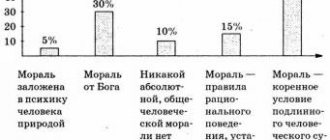Social studies test Law and property relations 9th grade
Social studies test Law and property relations, grade 9 with answers. The test consists of two parts. Part A - 6 tasks, part B - 4 tasks.
A1. Written demands of a person to protect violated rights in court are called
1) claim 2) contract 3) transaction 4) compensation
A2. Are the following judgments about transactions correct?
A. Only those transactions that are specified in the legislative acts of the Russian Federation are recognized as legal. B. Transactions that do not contradict Russian legislation are considered legal.
1) only A is true 2) only B is true 3) both judgments are correct 4) both judgments are incorrect
A3. Famous philanthropist P.M. Tretyakov donated the collection of paintings he had collected to Moscow. What manifestation of property rights does this example illustrate?
1) right of ownership 2) right of use 3) right of disposal 4) right of approval
A4. According to civil law, a contract
1) can be terminated unilaterally 2) is concluded only between individuals 3) can be changed without the consent of one of the parties 4) can be terminated by mutual agreement of the parties
A5. Are the following statements about transactions correct?
A. A person who does not have legal capacity cannot enter into transactions. B. According to the law, transactions cannot be concluded between close relatives.
1) only A is true 2) only B is true 3) both judgments are correct 4) both judgments are incorrect
A6. The family rented an apartment for a long time, agreeing to pay monthly rent. What agreement was concluded between the family and the owner of the apartment?
1) purchase and sale 2) contract 3) lease 4) donation
IN 1. Find similarities and differences between individuals and legal entities.
1) are subjects of civil law 2) have the right to go to court 3) have legal capacity 4) have an organizational structure 5) have a specific place of residence
Select and write down the serial numbers of the similarity traits in the first column of the table, and the serial numbers of the differences in the second column.
| Similarities | Features of difference |
AT 2. Find examples of legal entities in the list provided.
1) director of a private school 2) assistant director of the Start production association 3) Imperial Bank 4) buyer in a store 5) shoe manufacturing company
Write down the numbers under which legal entities are listed in ascending order.
AT 3. Match the names of the types of contracts and their characteristics: for each position given in the first column, select the corresponding position from the second column.
TYPES OF CONTRACTS
A) Contract agreement B) Rent agreement C) Rental agreement D) Barter agreement
CHARACTERISTICS
1) Transfer by one party to the other party of movable property for temporary use for a certain fee. 2) Each party transfers ownership of one product to the other party in exchange for another. 3) Performance by one party of certain work ordered by the other party for a fee. 4) Transfer of ownership of real estate by one party to another party for periodic payments.
Write down the selected numbers under the corresponding letters.
AT 4. All the terms listed below, with the exception of one , refer to the concept of “contract”.
Donation, contract, concession, storage, insurance.
Find and indicate a term that falls out of this series.
Answers to the social studies test Law and property relations Grade 9 A1-1 A2-2 A3-3 A4-4 A5-1 A6-3 B1. 12 345 V2. 35 B3. A3 B4 C1 D2 C4. Concession
PDF version Test Law and Property Relations Grade 9 109 Kb
social studies test “Politics and power”
- Find, consciously perceive and accurately reproduce information contained in the text explicitly
Mass political literacy of citizens is necessary for the entire society, because it protects it from despotism and tyranny, from inhumane and economically ineffective forms of state and public organization. Therefore, the conscious formation of political culture as the art of joint civilizational living of people in the state is the concern of the entire modern society, an important condition for its well-being...
A democratic system cannot establish itself and be effective without an appropriate political culture of the population. Democracy presupposes the transformation of a person into a source of power, the arbiter of the destinies of his country and international politics. And although in a democratic state not every individual has a real influence on political decision-making, it is on the consciousness of choice and the activity of citizens that the consideration in public policy of the interests of various groups of the population, the competence and responsibility of the ruling elites depend.
The ability of citizens to make rational decisions and participate in politics is not formed spontaneously, but is acquired through the systematic acquisition of relevant knowledge and experience...
Democratic political education is based on the recognition of basic humanistic values and, above all, the freedom and dignity of each individual, his natural, inalienable rights. It helps a citizen to correctly assess the relevant social system, to understand his place and role in the state, rights and responsibilities. Its main goal is to teach a person to adequately navigate the complex and contradictory modern world, to represent and protect their interests, respecting the interests and rights of other people, and to collectively solve common problems. It is also aimed at developing among citizens respect for the democratic order and the state and public institutions that ensure it, because without a solid political order, the freedom of an individual cannot be real.
Democratic political education is designed to give politics a human dimension, to restrain the manifestations in political actions of egocentric motivation, intolerance and emotional imbalance, as well as ideological class or nationalist irrationalism, often acting under the banner of the struggle for the total rationalization of society. One of its primary tasks is to develop among citizens a stable immunity, or at least a balanced, critical attitude towards various kinds of radical ideologies that are hostile to the democratic system and seek to impose one or another social utopia on society. (V.P. Pugachev, A.I. Soloviev).
1. Why, according to the authors, is mass political literacy of citizens necessary for the entire society? How do the authors define political culture?
1) explanation. Maybe: “mass political literacy of citizens is necessary for the whole society, because it protects it from despotism and tyranny, from inhumane and economically ineffective forms of state and public organization”;
2) definition, for example: “the art of joint civilizational living of people in a state.”




